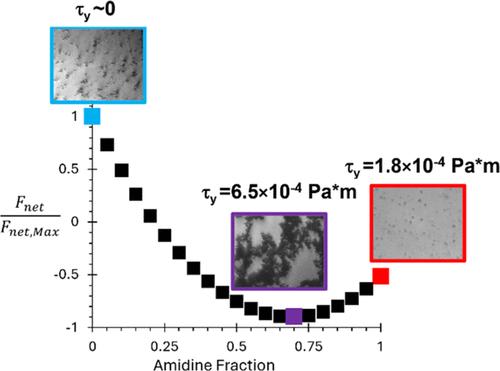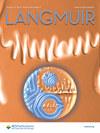Creating High Yield Stress Particle-Laden Oil/Water Interfaces Using Charge Bidispersity
IF 3.7
2区 化学
Q2 CHEMISTRY, MULTIDISCIPLINARY
引用次数: 0
Abstract
Interfacial engineering has been increasingly used to stabilize Pickering emulsions in commercial products and biomedical applications. Pickering emulsion stabilization is aided by interfacial viscoelasticity; however, typically the primary means of stabilization are steric hindrances between high surface concentration shells of particles around the drops. In this work, the concept of creating large interfacial viscoelastic yield stresses with low particle surface concentrations (<50%) using bidisperse charged particle systems is tested to evaluate their potential efficacy in emulsion stabilization. To explore this hypothesis, interfacial rheology and visualization experiments are conducted at o/w interfaces using positively charged amidine, negatively charged carboxylate, and negatively charged sulfate-coated latex spheres and compared to a model based on interparticle forces. Bidisperse particle systems have been observed to create more networked structures than monodisperse systems. For surface concentrations of <50%, bidisperse interfaces created measurable viscoelastic moduli ∼1 order of magnitude larger than monodisperse interfaces. Furthermore, these interfaces have measurable yield stresses on the order of 10–4 Pa·m when monodisperse systems have none. Bidispersity impacts surface viscoelasticity primarily by increasing the overall magnitude of attraction between particles at the interface and not due to changes in the microstructure. The developed model predicts the relative surface fraction that creates the largest moduli and shows good agreement with the experimental data. The results demonstrate the ability to create large viscoelastic moduli for small surface fractions of particles, which may enable stabilization using fewer particles in future applications.

利用电荷双分散性创建高屈服应力含颗粒油/水界面
在商业产品和生物医学应用中,越来越多地使用界面工程来稳定皮克林乳液。界面粘弹性有助于稳定皮克林乳液;然而,典型的主要稳定手段是液滴周围高表面浓度颗粒壳之间的立体阻碍。在这项工作中,我们测试了利用双分散带电颗粒系统在颗粒表面浓度较低(50%)的情况下产生较大界面粘弹性屈服应力的概念,以评估其在稳定乳液方面的潜在功效。为了探索这一假设,我们使用带正电的脒基、带负电的羧基和带负电的硫酸涂层乳胶球在邻/水界面上进行了界面流变学和可视化实验,并与基于粒子间作用力的模型进行了比较。与单分散系统相比,双分散颗粒系统可形成更多的网络结构。当表面浓度为 50%时,双分散界面产生的可测量粘弹性模量比单分散界面大 1 个数量级。此外,这些界面具有 10-4 Pa-m 量级的可测量屈服应力,而单分散系统则没有。双分散性对表面粘弹性的影响主要是通过增加界面上颗粒之间的整体吸引力而产生的,而不是由于微观结构的变化。所开发的模型可预测产生最大模量的相对表面分数,并与实验数据显示出良好的一致性。结果表明,在颗粒表面分数较小的情况下,也能产生较大的粘弹性模量,这可能会在未来的应用中使用更少的颗粒来实现稳定。
本文章由计算机程序翻译,如有差异,请以英文原文为准。
求助全文
约1分钟内获得全文
求助全文
来源期刊

Langmuir
化学-材料科学:综合
CiteScore
6.50
自引率
10.30%
发文量
1464
审稿时长
2.1 months
期刊介绍:
Langmuir is an interdisciplinary journal publishing articles in the following subject categories:
Colloids: surfactants and self-assembly, dispersions, emulsions, foams
Interfaces: adsorption, reactions, films, forces
Biological Interfaces: biocolloids, biomolecular and biomimetic materials
Materials: nano- and mesostructured materials, polymers, gels, liquid crystals
Electrochemistry: interfacial charge transfer, charge transport, electrocatalysis, electrokinetic phenomena, bioelectrochemistry
Devices and Applications: sensors, fluidics, patterning, catalysis, photonic crystals
However, when high-impact, original work is submitted that does not fit within the above categories, decisions to accept or decline such papers will be based on one criteria: What Would Irving Do?
Langmuir ranks #2 in citations out of 136 journals in the category of Physical Chemistry with 113,157 total citations. The journal received an Impact Factor of 4.384*.
This journal is also indexed in the categories of Materials Science (ranked #1) and Multidisciplinary Chemistry (ranked #5).
 求助内容:
求助内容: 应助结果提醒方式:
应助结果提醒方式:


